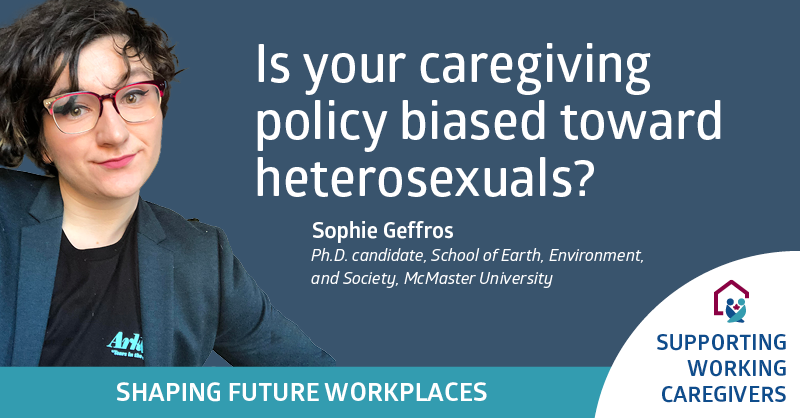Exploring the extent to which caregiving supports are perceived as designed for a heterosexual and cisgender audience.
The goal of this research was to gather insight into the experiences of Two-Spirit, lesbian, gay, bisexual, transgender, and queer (2SLGBTQ+) carer-employees.
To date, little attention has been paid to the experiences of 2SLGBTQ+ carer-employees. This research involved two exploratory studies which took place in the spring and summer of 2021. The first was a national, online, quantitative survey to explore the impact of concerns about identity disclosure and workplace level experiences of homophobia or transphobia on self-reported quality of life, work life, and access to caregiver accommodations.
The second involved a series of focus group interviews to gather deeper understanding of the experiences of 2SLGBTQ+ carer-employees at work and the extent to which the CSA Group B701:17 Carer-Inclusive and Accommodating Organizations Workplace Standard (Standard) reflects their needs.
There were 199 participants ranging from 18 to 64 years of age who responded to the quantitative survey. Most respondents were under 45 years. Respondents represented 20 different industries. The findings revealed a statistically significant relationship between age, gender identity and workplace level experiences of discrimination and overall quality of life and work life for 2SLGBTQ+ carer-employees. Older carer-employees were less likely to be out at work and less likely to be comfortable accessing accommodations if doing so would result in identity disclosure. Accordingly, they reported poor quality of life and work life.
Among younger 2SLGBTQ+ employees, Two-Spirit and transgender respondents reported the lowest quality of life and work life and were less likely to be out at work and less likely to access accommodations if disclosure would ensue. Workplace level experiences of homophobia or transphobia were significantly associated with poor quality of life, poorer quality work life, and higher levels of carer burden.
Focus groups were held in Vancouver, British Columbia, Thunder Bay and the greater Toronto area, Ontario. Participants (n=17) were employed in health care, education, social services, business, and retail/customer service. Respondent’s working in insecure customer service positions or in social service sectors were particularly less likely to believe their workplace would be able to offer them appropriate accommodations.
Some respondents indicated that the provisions in the Standard were present in their workplaces but not meeting their needs. Others believed that their workplaces were unlikely to adopt policies such as flex time, remote work, and job sharing. They also indicated that caregiving supports seem to them to be aimed at a heterosexual and cisgendered audience. Respondents working in retail and customer service felt their employer would be unwilling to implement the Standard and those in other sectors were skeptical that their employer would achieve meaningful implementation of the Standard.
This study has implications for employers to consider ways in which they can support their employees to feel safe accessing caregiving accommodations. Workplaces might benefit from self-assessments as to their responsiveness to the needs of their 2SLGBTQ+ employees. Caregiving accommodation should consider offering general caregiving leaves and policy should explicitly apply to anyone providing care to another individual. Policy documents should use gender neutral terms wherever possible.
Read the complete briefing note
ABOUT THE PROJECT
Carers Canada is leading the knowledge mobilization activities for a multi-sectorial research program to spread and scale a carer-friendly workplace standard, known as the Carer-Inclusive and Accommodating Organizations’ Standard (CSAB701-17). Led by Dr. Allison Williams, CIHR Research Chair in Gender, Work and Health at McMaster University, the research program consists of six inter-related sub-projects that will: increase awareness of the standard across Canada; evaluate readiness to change; determine feasibility and cost benefit; embrace cultural competency; consider Indigenous perspectives; and create an international standard. Visit PARTNERSHIP PROJECT SITE here

CIHR/SSHRC Healthy Productive Work Partnership Grant “Scaling up the Career Inclusive Accommodating Organizations Standard” FRN: HWP-146001 (CIHR); 890-2016-3018 (SSHRC).
 Sophie Geffros,March 24, 2022
Sophie Geffros,March 24, 2022

Carer-employee inclusivity – gender neutral and respectful of 2SLGBTQ+ employees
Exploring the extent to which caregiving supports are perceived as designed for a heterosexual and cisgender audience.
The goal of this research was to gather insight into the experiences of Two-Spirit, lesbian, gay, bisexual, transgender, and queer (2SLGBTQ+) carer-employees.
To date, little attention has been paid to the experiences of 2SLGBTQ+ carer-employees. This research involved two exploratory studies which took place in the spring and summer of 2021. The first was a national, online, quantitative survey to explore the impact of concerns about identity disclosure and workplace level experiences of homophobia or transphobia on self-reported quality of life, work life, and access to caregiver accommodations.
The second involved a series of focus group interviews to gather deeper understanding of the experiences of 2SLGBTQ+ carer-employees at work and the extent to which the CSA Group B701:17 Carer-Inclusive and Accommodating Organizations Workplace Standard (Standard) reflects their needs.
There were 199 participants ranging from 18 to 64 years of age who responded to the quantitative survey. Most respondents were under 45 years. Respondents represented 20 different industries. The findings revealed a statistically significant relationship between age, gender identity and workplace level experiences of discrimination and overall quality of life and work life for 2SLGBTQ+ carer-employees. Older carer-employees were less likely to be out at work and less likely to be comfortable accessing accommodations if doing so would result in identity disclosure. Accordingly, they reported poor quality of life and work life.
Among younger 2SLGBTQ+ employees, Two-Spirit and transgender respondents reported the lowest quality of life and work life and were less likely to be out at work and less likely to access accommodations if disclosure would ensue. Workplace level experiences of homophobia or transphobia were significantly associated with poor quality of life, poorer quality work life, and higher levels of carer burden.
Focus groups were held in Vancouver, British Columbia, Thunder Bay and the greater Toronto area, Ontario. Participants (n=17) were employed in health care, education, social services, business, and retail/customer service. Respondent’s working in insecure customer service positions or in social service sectors were particularly less likely to believe their workplace would be able to offer them appropriate accommodations.
Some respondents indicated that the provisions in the Standard were present in their workplaces but not meeting their needs. Others believed that their workplaces were unlikely to adopt policies such as flex time, remote work, and job sharing. They also indicated that caregiving supports seem to them to be aimed at a heterosexual and cisgendered audience. Respondents working in retail and customer service felt their employer would be unwilling to implement the Standard and those in other sectors were skeptical that their employer would achieve meaningful implementation of the Standard.
This study has implications for employers to consider ways in which they can support their employees to feel safe accessing caregiving accommodations. Workplaces might benefit from self-assessments as to their responsiveness to the needs of their 2SLGBTQ+ employees. Caregiving accommodation should consider offering general caregiving leaves and policy should explicitly apply to anyone providing care to another individual. Policy documents should use gender neutral terms wherever possible.
Read the complete briefing note
Sophie Geffros (they/them) is a Ph.D candidate working under Dr. Suzanne Mills and Dr. Robert Wilton in the School of Earth, Environment, and Society at McMaster University. Sophie’s research focuses on the intersections between work, precarity, 2SLGBTQ+ identity, and caregiving. As a community organizer, activist, and communicator they aim to bridge the gaps between 2SLGBTQ+ experiences and the formal research community, while providing opportunities for 2SLGBTQ+ workers to share their experiences. Their writing can be found in the Downtown Sparrow, Widget Magazine, and Raise the Hammer. They live in Hamilton, Ontario, with their partner and two cats.
FAVORITE PASTIME: Gardening
Twitter: @sgeffros
Instagram: @atshirtaway
ABOUT THE PROJECT
Carers Canada is leading the knowledge mobilization activities for a multi-sectorial research program to spread and scale a carer-friendly workplace standard, known as the Carer-Inclusive and Accommodating Organizations’ Standard (CSAB701-17). Led by Dr. Allison Williams, CIHR Research Chair in Gender, Work and Health at McMaster University, the research program consists of six inter-related sub-projects that will: increase awareness of the standard across Canada; evaluate readiness to change; determine feasibility and cost benefit; embrace cultural competency; consider Indigenous perspectives; and create an international standard. Visit PARTNERSHIP PROJECT SITE here

CIHR/SSHRC Healthy Productive Work Partnership Grant “Scaling up the Career Inclusive Accommodating Organizations Standard” FRN: HWP-146001 (CIHR); 890-2016-3018 (SSHRC).